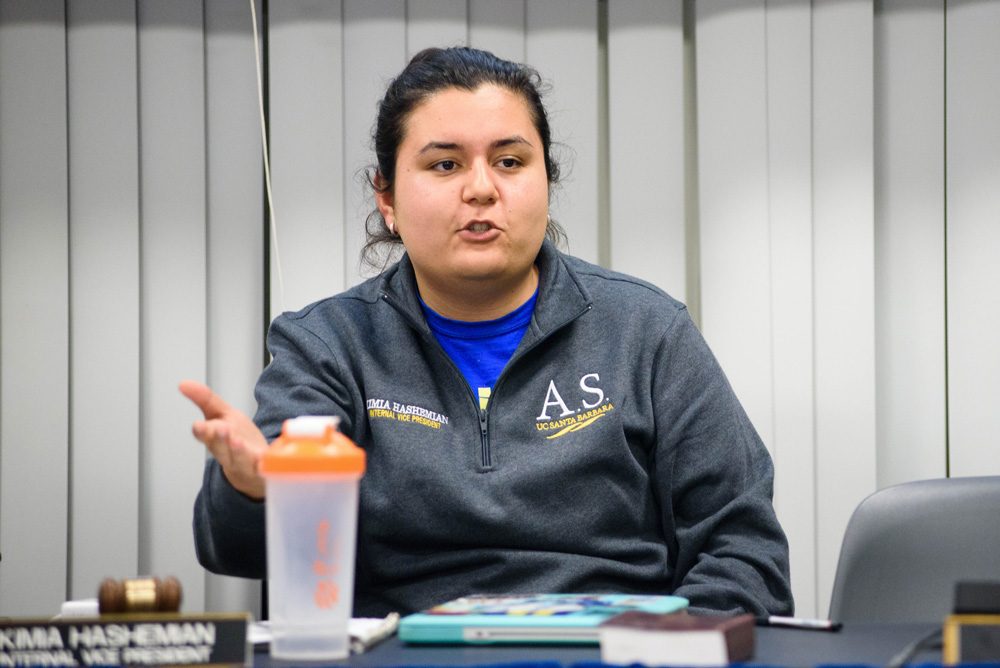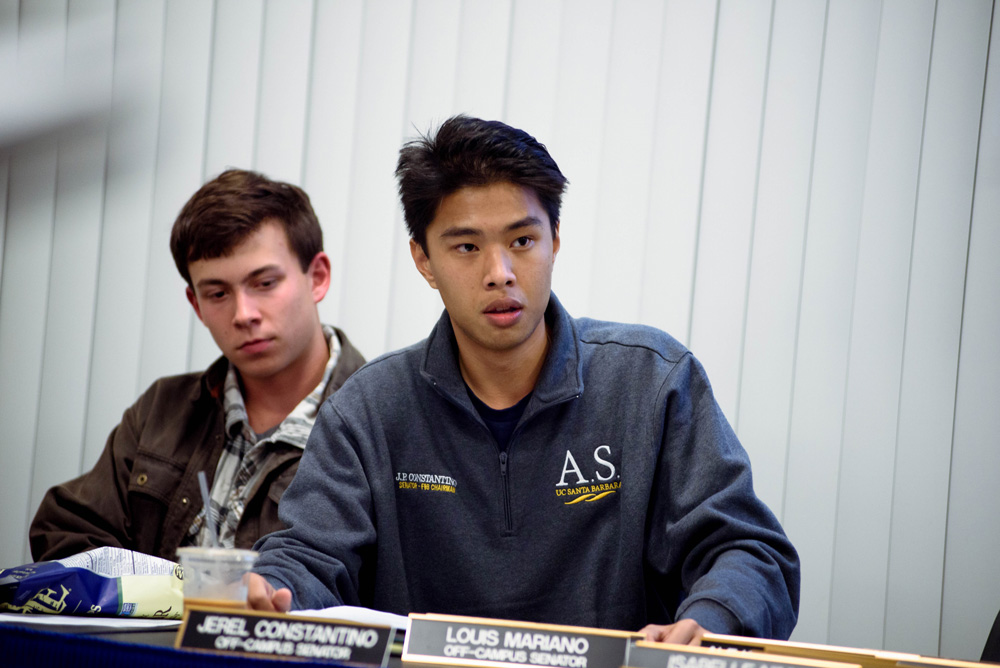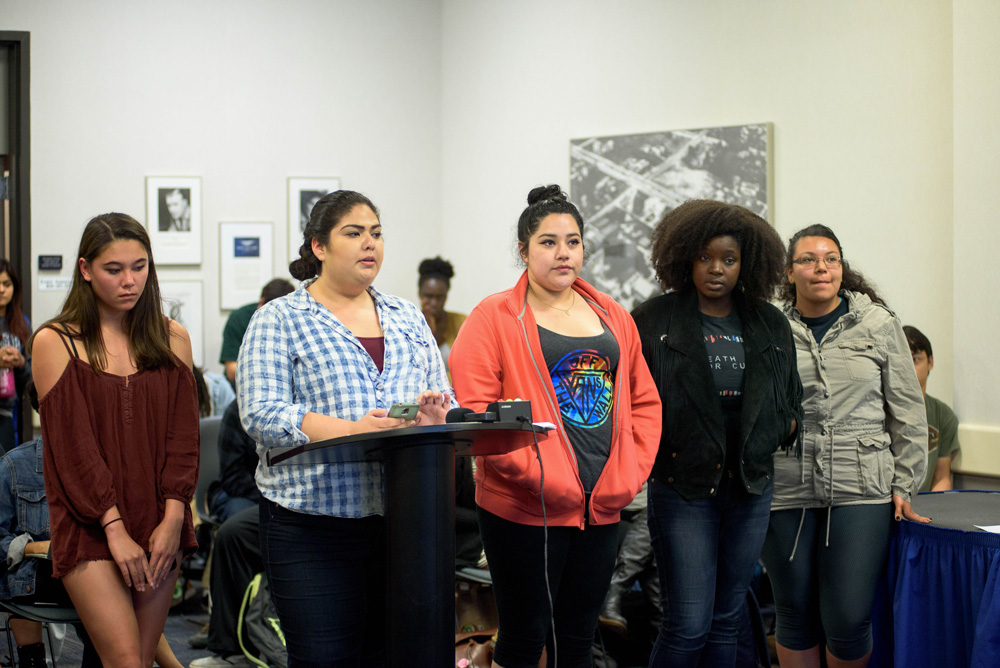Gwendolyn Wu
Campus Beat Reporter
Associated Students representatives packed the Flying A Room Wednesday night for an emergency A.S. Senate meeting in response to A Bill to Reform Honoraria. Members of various A.S. boards, commissions and units (BCUs) came on Wed., March 9 to express their thoughts on the bill’s passage.
Representatives from BCUs including, but not limited to, Humyn Rights Board, Queer Commission, Coastal Fund, Student Commission for Racial Equality (SCORE) and Committee on Committees voiced concerns about the bill. Most senators — 17 at the start — were in attendance, though not required to attend due to the meeting’s last-minute scheduling.
There was initial confusion over how much speaking time was allotted to representatives from each BCU. Internal Vice President and fourth-year sociology major Kimia Hashemian sent an email to the A.S. Entities prior to the meeting with a list of emergency Senate meeting rules, all of which apply to regularly scheduled meetings with the exception of Hashemian’s request that the audience not snap, clap or cheer. However, while the rules previously stated that each representative would get three minutes to speak, Hashemian’s email limited it to two in the interest of time, with no extensions.
“‘I would just like to convey while I believe there needs to be a change in honoraria policies, I do not agree with an umbrella cap that all entities have to follow,’” second-year history of public policy major Nawar Nemeh said on behalf of the Office of the Controller. A.S. Controller Winnie Ouyang, a second-year financial mathematics and statistics double major, was unable to attend.
Nemeh’s own statement as a concerned student addressed that, though Senate emails its meeting agendas and minutes out to BCUs every week, A.S. Legal Code stipulates that the honoraria committee vice chair must directly contact all BCU chairs to discuss substantial reforms before they are voted on. Honoraria can only be reviewed in the winter quarter of every even year, according to Legal Code, but votes pertaining to that review can take place later in the Senate term.
Many BCU representatives present stated that they support caps on honoraria but expressed concern that they had not been consulted in the process. Some senate liaisons claimed they had emailed their respective BCUs but did not receive a response. College of Letters and Sciences Senator and third-year history of public policy major Ashcon Minoiefar proposed a senator and chair rating system within A.S. in order to ease communication between members of the Association, especially during times like these.

After the bill was passed the previous week, Off-Campus Senator and second-year political science and Asian American studies double major Akshaya Natarajan demanded the special meeting, drawing support from fellow senators and BCU chairs. During the meeting, she addressed Senators’ concerns that honoraria had become a reliable income for students used to pay for necessities, rather than a reward.
“How dare you pretend to represent student interests and tell them that no one uses their honoraria for rent, or that they work for us?” Natarajan said. “Do not be confused, fellow senators. We work for them.”
Off-Campus Senator and third-year history of public policy major Jerel Constantino voiced his concerns about the timing of honoraria discussion and the feasibility of holding a forum with BCUs every time a fiscal policy changes, noting that honoraria discussion is not new to the Senate. Constantino questioned why no one had objected to honoraria when the IVP was campaigning for it during elections, during its proposal at Senate’s Feb. 24 meeting or in the Senate Internal Committee.
“Why [were these concerns] not raised up when the bill was about to pass by consent, until I objected because I was not comfortable because there was no discussion on this?” Constantino read from a prepared statement. “The Senate is acting within their power by enacting this broad fiscal policy, and it makes sense. It’s what the students want. We have to make hard choices for the work and Association we all love.”

Off-Campus Senator and third-year biopsychology major Niki Elyasi motioned to end the discussion on the grounds that the full Senate was not there to decide how to proceed. Following public forum, several senators left voluntarily or were dismissed from the table for speaking out of turn. Per Legal Code, Senate had to meet quorum (50 percent plus one senator) by 7:30 p.m. in order to vote on any action but lost five senators who left or were dismissed for disruption after that time. As a result, the Senate adjourned.
As the meeting drew to an end, senators shared multiple ideas about how to proceed from this point onward. While a few argued that Senate should open up the minutes from the previous meeting to retroactively table the bill, Minoiefar argued the body could do more by creating future bills to amend Legal Code or A Bill to Reform Honoraria. In doing so, Senate could review honoraria more frequently during the academic year or spend time talking to BCUs about what changes need to be made.












